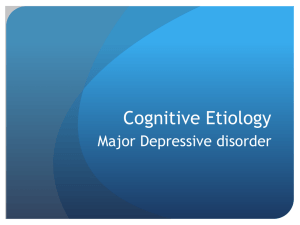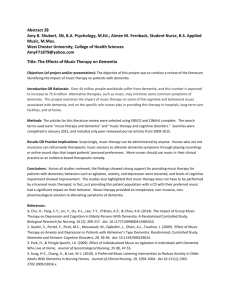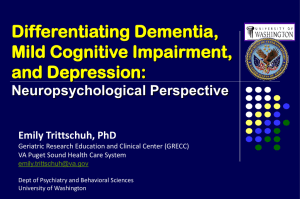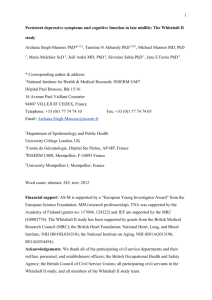Dementia and Depressive Pseudodementia: Differential Diagnosis
advertisement
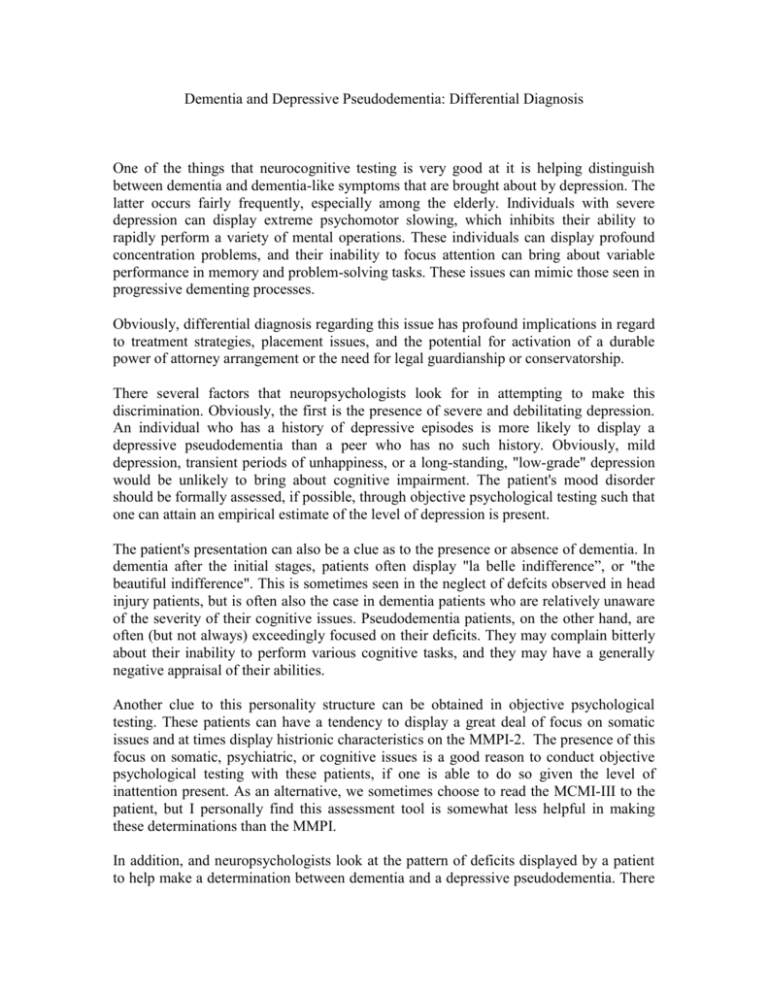
Dementia and Depressive Pseudodementia: Differential Diagnosis One of the things that neurocognitive testing is very good at it is helping distinguish between dementia and dementia-like symptoms that are brought about by depression. The latter occurs fairly frequently, especially among the elderly. Individuals with severe depression can display extreme psychomotor slowing, which inhibits their ability to rapidly perform a variety of mental operations. These individuals can display profound concentration problems, and their inability to focus attention can bring about variable performance in memory and problem-solving tasks. These issues can mimic those seen in progressive dementing processes. Obviously, differential diagnosis regarding this issue has profound implications in regard to treatment strategies, placement issues, and the potential for activation of a durable power of attorney arrangement or the need for legal guardianship or conservatorship. There several factors that neuropsychologists look for in attempting to make this discrimination. Obviously, the first is the presence of severe and debilitating depression. An individual who has a history of depressive episodes is more likely to display a depressive pseudodementia than a peer who has no such history. Obviously, mild depression, transient periods of unhappiness, or a long-standing, "low-grade" depression would be unlikely to bring about cognitive impairment. The patient's mood disorder should be formally assessed, if possible, through objective psychological testing such that one can attain an empirical estimate of the level of depression is present. The patient's presentation can also be a clue as to the presence or absence of dementia. In dementia after the initial stages, patients often display "la belle indifference”, or "the beautiful indifference". This is sometimes seen in the neglect of defcits observed in head injury patients, but is often also the case in dementia patients who are relatively unaware of the severity of their cognitive issues. Pseudodementia patients, on the other hand, are often (but not always) exceedingly focused on their deficits. They may complain bitterly about their inability to perform various cognitive tasks, and they may have a generally negative appraisal of their abilities. Another clue to this personality structure can be obtained in objective psychological testing. These patients can have a tendency to display a great deal of focus on somatic issues and at times display histrionic characteristics on the MMPI-2. The presence of this focus on somatic, psychiatric, or cognitive issues is a good reason to conduct objective psychological testing with these patients, if one is able to do so given the level of inattention present. As an alternative, we sometimes choose to read the MCMI-III to the patient, but I personally find this assessment tool is somewhat less helpful in making these determinations than the MMPI. In addition, and neuropsychologists look at the pattern of deficits displayed by a patient to help make a determination between dementia and a depressive pseudodementia. There are various and specific deficits displayed on subtests that, in isolation, are quite indicative of the presence of cognitive difficulties related to mood disturbance as opposed to organic illness. For example, the initiation/perseveration subtest of the Dementia Rating Scale is a good indicator of psychomotor slowing and difficulties initiating mental operations. A low score on this subtest without accompanying deficits in measured memory functioning is often a strong indicator of the existence of a depressive pseudodementia. Making this differential diagnosis involves savvy use of objective psychological testing techniques, a good understanding of cognitive testing techniques, and to certain extent requires a clinician that has experience seeing many patients with various types of dementia is and with depressive pseudodementia issues. The ability to make this differential diagnosis can often significantly and positively influence the quality of life for the individuals involved, this is one of the more gratifying aspects of providing neurocognitive testing for older adults.





